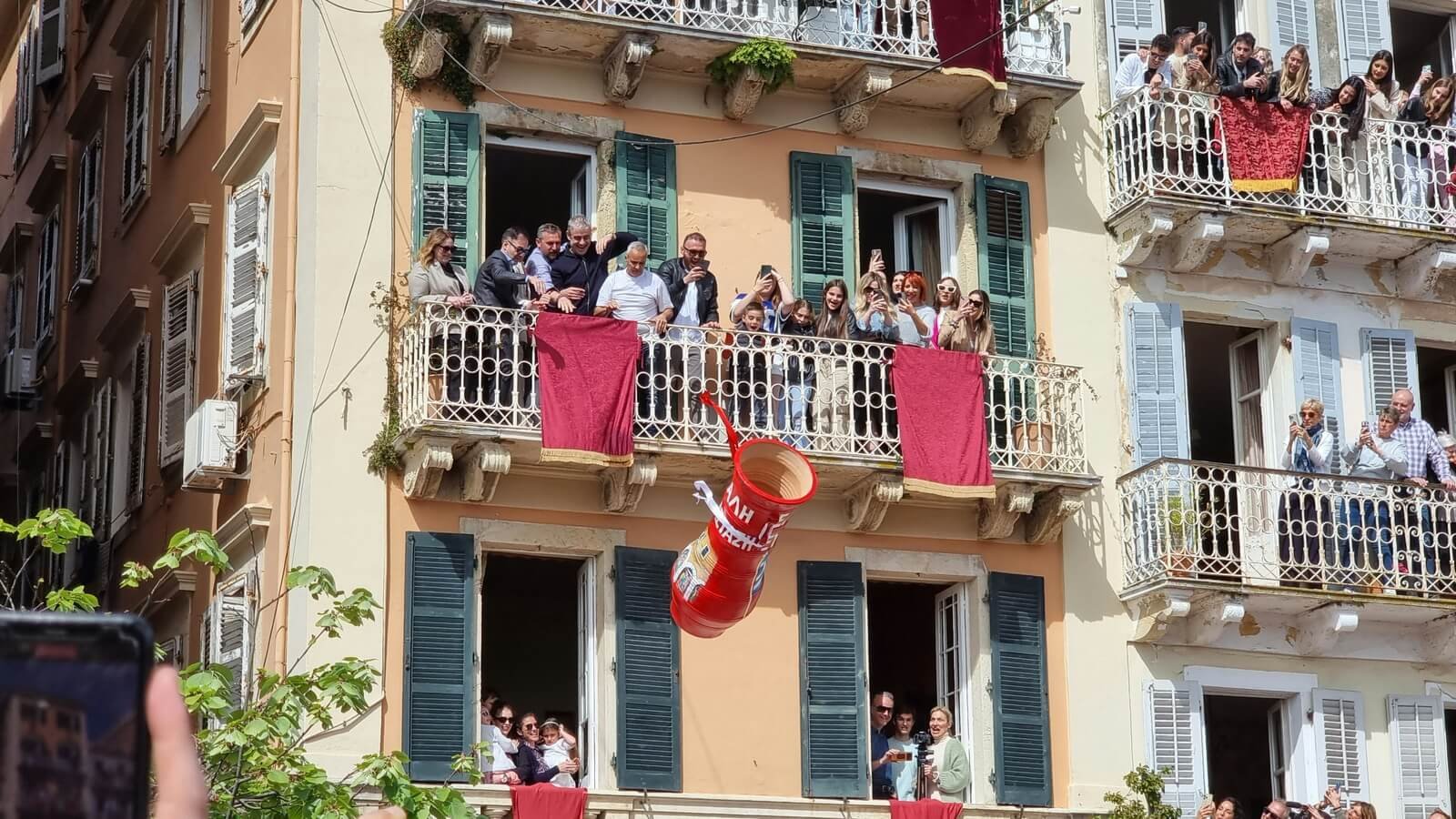If you love exploring ancient customs and traditions you should experience Easter in Corfu.
Why?
Orthodox Easter is more than just a holiday—it’s a vibrant celebration deeply rooted in Greek tradition.
Easter in Corfu is not just a religious holiday—it is a breathtaking cultural event that blends faith, history, and vibrant traditions. The island’s mix of Greek, Venetian, and British influences creates a one-of-a-kind Orthodox Easter experience that captivates both locals and visitors.
The Greek Orthodox Church follows the Julian calendar, meaning that Easter often falls on a different date than in Western Christianity. This adds to the excitement, as travelers flock to Corfu to witness the island’s spectacular Easter customs that have been passed down through generations.
Holy Week in Corfu (Megali Evdomada): A Journey Through Faith
Holy Week, or Megali Evdomada, is the most sacred time leading up to Orthodox Easter Sunday. Each day is filled with religious services, processions, and rituals that reflect the island’s deep devotion to faith.
On Good Friday, the Epitaph Procession takes place, symbolizing the burial of Christ. Each church in Corfu carries an epitaph, a beautifully decorated bier adorned with flowers, through the streets. The solemn hymns, candlelit atmosphere, and participation of thousands create a deeply moving experience.
Holy Saturday marks the First Resurrection (Proti Anastasi), a moment of spiritual anticipation and joy. As church bells toll, the faithful gather in the streets, ready to witness one of Corfu’s most famous Easter customs.
Botides: The Spectacular Pot-Throwing Tradition

The highlight of Holy Saturday morning is Botides, the famous pot-throwing tradition unique to Corfu. At exactly 11:00 AM, residents hurl large clay pots filled with water from their balconies, crashing them onto the streets below.
This tradition is believed to have origins in both Venetian and Greek customs, symbolizing the casting away of the old and welcoming the new. The deafening sound of breaking pots, combined with the cheers of the crowd, creates an electrifying atmosphere that marks the beginning of Easter celebrations.
The Resurrection Ceremony: A Night of Light and Joy
As night falls on Holy Saturday, thousands of people gather in Corfu’s central square and church courtyards for the Resurrection Ceremony. Just before midnight, the town plunges into darkness. Then, the priest announces, “Christos Anesti!” (Christ is Risen), and the Holy Flame is passed from candle to candle, illuminating the night.

The sky erupts in fireworks, the bells ring joyfully, and the island bursts into celebration. This moment of pure elation symbolizes the triumph of life over death and the renewal of faith and hope.
The Philharmonic Bands of Corfu: A Musical Easter Tradition

Corfu’s Easter celebrations are accompanied by the mesmerizing sounds of the Philharmonic Bands of Corfu. These orchestras, some dating back to the 19th century, perform powerful symphonies throughout Holy Week.
Their most notable performance takes place on Good Friday, during the Epitaph Procession, where they play compositions such as Albinoni’s Adagio and Verdi’s Marcia Funebre.
On Easter Sunday, the bands transform the streets into a lively parade, playing joyful marches that add to the festive atmosphere.
A Feast of Greek Easter Delicacies
No Greek Easter celebration is complete without a grand feast, and Corfu is no exception. After the Resurrection Ceremony, families and friends gather to enjoy Magiritsa, a traditional lamb soup that signifies the end of Lent.
Easter Sunday is a day of indulgence, with roast lamb taking center stage. Grilled to perfection over an open fire, it is served alongside red-dyed eggs, symbolizing the blood and resurrection of Christ. Tsoureki, a sweet, braided bread, is also a staple on every Easter table.
Another local specialty is Fogatsa, a sweet, fluffy brioche-style bread with Venetian influences, often decorated with a red egg in the center. Additionally, Colombina, a type of Easter cake shaped like a dove, is also enjoyed during this period.
The Role of Religion and Community in Corfu’s Easter
Easter in Corfu is not just about the traditions—it is a deeply spiritual experience for locals. The community unites through religious observances, strengthening their faith and bonds with one another. Families gather for prayers, homes are decorated with Easter symbols, and churches hold services filled with hymns that echo through the island’s streets.
In the days leading up to Easter, visitors can witness people lining up for confession and taking part in Holy Communion. The island’s strong connection to its faith is evident in the dedication of its people to upholding these time-honored customs.
Easter Monday: A Day of Rest and Celebration
While Easter Sunday is the highlight of the celebrations, Easter Monday is a day of continued joy, family gatherings, and relaxation. Locals take trips to the countryside for picnics, and traditional music and dancing fill the villages. Many also visit the graves of loved ones, a custom that reflects the Orthodox belief in eternal life.

Experience Easter in Corfu
If you are looking for a cultural and spiritual experience like no other, Orthodox Easter in Corfu should be at the top of your list. The island’s breathtaking traditions, heartfelt celebrations, and warm hospitality make it one of the best places in the world to witness Easter.
From the solemn Epitaph Procession to the exhilarating Botides, and the grand feasts to the enchanting Philharmonic Bands, Corfu’s Easter is a spectacle of faith, joy, and history. Plan your visit and immerse yourself in this unforgettable celebration!
Photos by Daniele Fasoli and Dave Herring on Unsplash
